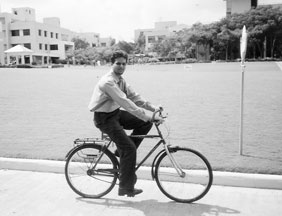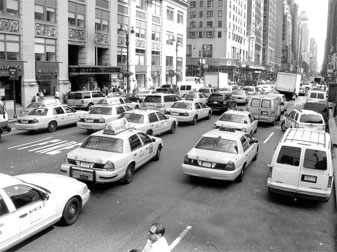Saving fuel - and money
 Last week, we looked at some of the options available to the
Government for reducing fuel consumption, including the popularization
of diesel vehicles. These are decisions that have to be made by
lawmakers and regulators, not by the public. But there are some
decisions that can be taken by both the Government and the public for
reducing fuel consumption. Last week, we looked at some of the options available to the
Government for reducing fuel consumption, including the popularization
of diesel vehicles. These are decisions that have to be made by
lawmakers and regulators, not by the public. But there are some
decisions that can be taken by both the Government and the public for
reducing fuel consumption.
One has to analyse why everyone in Sri Lanka aspires to own a motor
vehicle, at least a motorcycle. Personal enhancement and prestige do
play a part, but the bigger reasons are more obvious.
The prime reason is that Sri Lanka's public transport system is still
not up to the mark despite an abundance of private buses on our roads.
The railway system, which has seen rapid development over the last few
years, too cannot cope with the demand.
What Sri Lanka lacks is a mass transit system that is fast,
efficient, clean and punctual. That could be an inducement for many car
owners to leave their cars at home or at a designated parking spot. A
metro, or an underground train system is vital for Colombo and key
cities to afford rapid transport and to ease traffic congestion.
 The bus service too could be improved. There is a surfeit of buses on
some routes while there are only a few servicing many routes in remote
areas. This is one reason why most households in remote areas
increasingly have at least a motorcycle. The bus service too could be improved. There is a surfeit of buses on
some routes while there are only a few servicing many routes in remote
areas. This is one reason why most households in remote areas
increasingly have at least a motorcycle.
A streamlined, more comfortable bus service could be an answer to
transport woes. The authorities must also consider having separate bus
lanes to speed up the 'flow' of buses. The City Liner bus service, still
in an experimental stage, is slowly winning over customers. Driving
people away from their cars is not an easy task. Yet, many countries
have achieved a fair degree of success through the operation of good
public transport systems. Even taking 100 cars off the road per day can
make a difference in terms of fuel consumption and pollution.
Sri Lankans have also not got used to the idea of 'car pooling',
whereby several people travelling on the same route share a car. The
nearest equivalent is the ubiquitous office-van service, where one pays
the owner of the van a monthly sum. Car pooling, on the other hand, does
not usually involve money.
The idea is that over the course of the week, co-workers take turns
ferrying each other to an agreed destination. The idea is that instead
of say, five cars, only one car enters the road thereby saving a huge
quantity of fuel.
The other requirement is a reliable taxi service. The three wheeler
does render a yeoman service to a certain segment of the population, but
many car owners simply do not want to board one as their reputation
leaves a lot to be desired. There are a few radio taxi services, but
they can never match the level of a good taxi service as seen in
Singapore, Tokyo, London or New York.
Sri Lanka needs an efficient, frequent, reliable and above all,
affordable islandwide four-wheeled metered taxi service. It should be as
simple as hailing one on the street- just as with three wheelers today.
Perhaps a locally manufactured car can be used to establish such a taxi
service, to save foreign exchange as well.
Another question that we have to ask ourselves is - do we have to
travel at all or whether a car is necessary for each and every journey.
Why not use the phone to find out whether a place is open or closed
before you start the car? Why not try to find whether the information
you are looking for is available over the phone or online without
necessarily going there? Many motorists are in the habit of taking their
car even for a short drive to the nearest boutique or junction.
 Is that really necessary? Isn't it possible to walk a kilometre or
two once in a while? It is good for one's health, produces zero
emissions and saves at least a litre of fuel every time. Or try taking
the bus to the next junction. If it is just a short distance, the round
trip fare is only Rs.12, whereas a litre of normal petrol costs Rs.115.
One can also avoid parking worries by using public transport. Is that really necessary? Isn't it possible to walk a kilometre or
two once in a while? It is good for one's health, produces zero
emissions and saves at least a litre of fuel every time. Or try taking
the bus to the next junction. If it is just a short distance, the round
trip fare is only Rs.12, whereas a litre of normal petrol costs Rs.115.
One can also avoid parking worries by using public transport.
Another pathetic situation is that Sri Lanka does not have a cycling
culture. There are a lot of bicycles in the country, but they are
primarily used in rural areas for work related matters, not as a sort of
way of life, as in many other countries which have designated bicycle
lanes and parking slots. Riding a bicycle on our roads is a deadly
business indeed, as they have to fight for road space with motorized
vehicles big and small. It is not too late to think about having cycling
lanes - and laws, such as the use of helmets and other safety gear.
A cycling culture does indeed have the power to transform the
transport scene. Just like walking, cycling is healthy and saves fuel
and money. Our transport planners and lawmakers must give serious
thought to this issue aiming at a long term solution. Motorcycles too
are very popular, but the authorities must encourage the purchase and
use of all-electric bikes and scooters that could help save fossil
fuels.
Fuel is expensive at the point of import and at the pumps. The
Government alone cannot do this. It is the duty of all to help save fuel
and thus foreign exchange.
The various steps outlined above are just a few of the measures that
can be taken to reduce fuel consumption at national and personal levels.
There could be many more ways in which this can be achieved, including
conducting research on this issue at our universities and research labs.
It should be a collective effort. Even the smallest step can
collectively lead to a significant reduction in fuel consumption and
expenditure.
|

